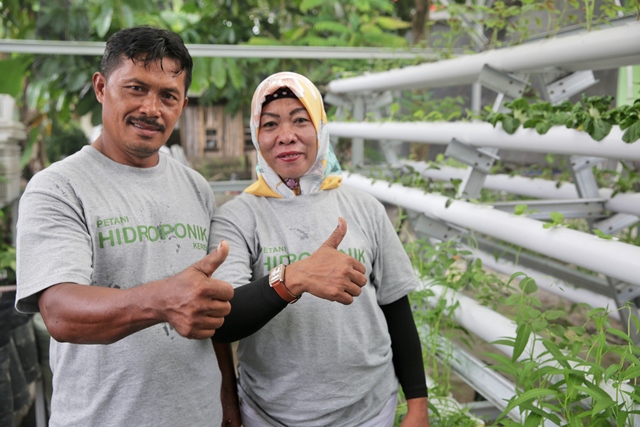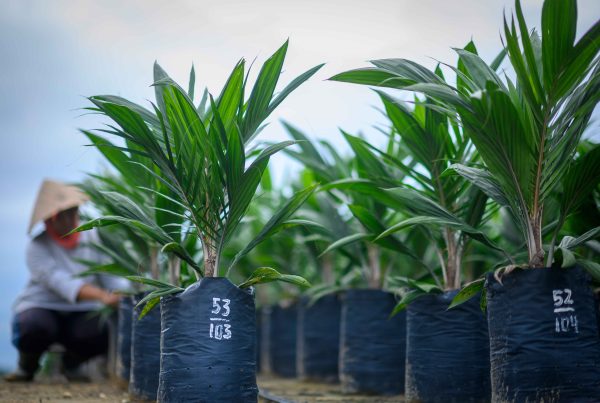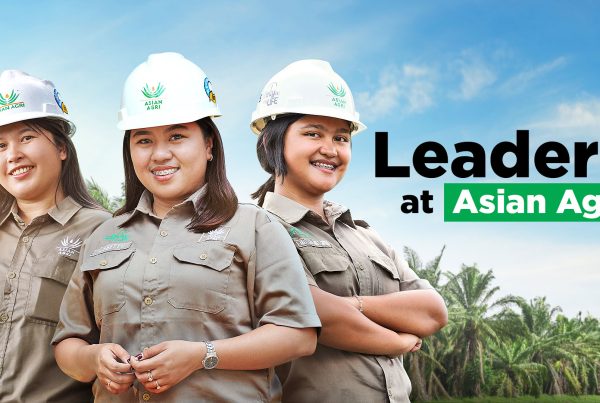Jumadi wasn’t even thinking of becoming an oil palm farmer when he first came to Pangkalan Kerinici in Riau, Sumatra to visit a friend.
However, when he saw the impact it had on his friend’s income, Jumadi decided to sell his belongings in his hometown in Kediri, East Java, and move to Riau.
“I was a paddy farmer in Java but with seven mouths in the family to feed, my monthly income was never enough to cover our needs,” Jumadi said.
He decided to invest his life savings and embark on a new career. “I had a little money saved up from when I was a migrant worker in Malaysia, and I spent it on acquiring two hectares of oil palm plantation,” Jumadi said.
Jumadi moved with his wife and children to Pangkalan Kerinci in 2002. He learned about Asian Agri as soon as he arrived in Riau, and immediately began partnering with the company.
“In 2003, I joined the Bina Karya smallholder group. We received a lot of benefits from partnering with Asian Agri, beginning with how they provided us with training on how to become better farmers,” he said.
When caterpillars attacked the smallholders’ plantations, they immediately turned to Asian Agri, which carried out fogging to clear the infestation.
The company also came through when the farmers discovered that the leaves of their oil palms were turning an unnatural yellow.

“We asked Asian Agri for help and the company conducted some lab research to find a solution,” he said.
The smallholders can also go to Asian Agri for a loan if they intended to begin alternative businesses.
“Whenever we have a problem, Asian Agri always does its best to quickly come up with solutions,” Jumadi said.
The significant improvement in the family’s quality of life as a result of the partnership with Asian Agri was evident when Jumadi and his wife were able to send three of their five children to university.
Throughout the years, the couple has remained passionate about farming. They have not stopped developing their knowledge, and constantly seek the best methods to grow food.
Dwi Puspito Rini, Jumadi’s wife, shared that her husband first heard about hydroponics in 2014.
Hydroponics is a method of growing plants without soil, by feeding the plants with mineral nutrient solutions through a water solvent.
“He was very curious about it and wanted to know more. When he knew enough about it, he wanted to try it out and he hasn’t stopped since,” she laughed.
The couple went to Indragiri Hulu Regency to find out more about hydroponics, before trying their hand at it. After more than four years, they consider themselves rather well-versed in hydroponic gardening.
“Personally, I really like it because the treatment method is really simple and we do not need to tend much to the growing plants, unlike traditional soil-based agriculture,” Rini explained, saying that vegetables can be produced twice as fast with a well-managed hydroponic system in place.
“We can even harvest certain kinds of vegetables three days after they are planted,” she said.
The couple built a greenhouse for their hydroponic plants right next to their house, and hydroponic gardening has even become a family activity, with Jumadi and Rini’s youngest two children also taking part.
“My husband learned how to assemble the required equipment made of pipes so we don’t need to buy it from other people, and my two sons and I are in charge of the entire planting process,” Rini said.
The couple even sells the pipes to others, at a starting price of IDR 2 million.
Although the hydroponic vegetables are almost identical in taste to those grown in the soil, the couple admits they initially faced difficulties in introducing others to the hydroponic crops.
“At first, it was really hard to sell the hydroponic vegetables because so few people knew about them. They always mistook them for decorative plants,” Rini said.
But Rini continued to market the hydroponic vegetables within her neighborhood.
“Back then, my neighbor would say that I wasn’t supposed to harvest the crops as they are too pretty,” she recalls.
Jumadi and Rini then found a better way to market both the hydroponic vegetables and medium, through the Food Security Agency in Siak Regency.
“Many people were interested and one person in Minas district even ordered five packages at once. He is still a loyal customer today, thankfully,” Rini said.
The couple’s passion for hydroponic gardening has resulted in it becoming an alternative source of income for them now, which supplements their primary income from their oil palm plantation.
“We want to keep exploring possibilities and develop our farming practices, but we’ll always remember at heart that oil palms and Asian Agri are what improved our living conditions in the first place to the point where we’re able to branch out into other things now,” Rini said.



